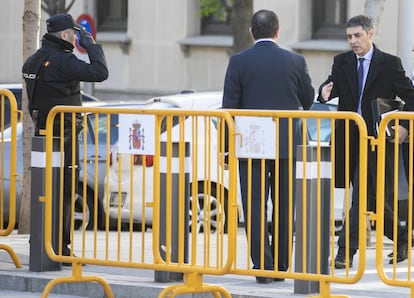Ex-Catalan police chief was ready to arrest Puigdemont if ordered to do so
Josep Lluís Trapero tells the Supreme Court that the Mossos d’Esquadra had prepared for the detention of the then-regional premier two days ahead of the unilateral independence declaration of October 27, 2017

Josep Lluís Trapero, the man who was in charge of the Catalan police when the regional government held an unauthorized independence referendum on October 1, 2017, delivered two forceful messages during his four-hour testimony at the Supreme Court on Thursday.
Speaking as a witness at the trial of the 12 separatist leaders accused of rebellion over their attempt at a unilateral breakaway from Spain, Trapero said he warned then-premier Carles Puigdemont of the risk of unrest on October 1, and asked him to cancel the referendum.
The second revelation by the former head of the Mossos d’Esquadra is that he had a police operation ready to arrest Puigdemont and his governing team if ordered to do so by a judge, in light of the independence declaration made inside the Catalan parliament on October 27. But the order did not come, and two days later Puigdemont fled to Belgium, where he remains.
Trapero’s court appearance was something of a dress rehearsal for his own upcoming trial at Spain’s High Court
Trapero’s court appearance was something of a dress rehearsal for his own upcoming trial at Spain’s High Court, the Audiencia Nacional, where he himself faces rebellion charges in connection with the secession attempt. The former police chief was under no obligation to give testimony on Thursday, as anything he said can be used against him at his own hearings, but Trapero chose to do so in what amounted to an efficient if unofficial defense based on the idea that he, and the police force that he headed, were always on the side of the law.
By the time his own trial gets underway in a few months, the Supreme Court will have already entered a judgment in the current case, a fact that may have influenced Trapero’s decision to accept giving witness testimony to help his own cause.
Trapero’s stalwart defense of the Mossos served as a counterpoint to criticism heard at previous sessions, when top officials of the National Police and Civil Guard accused the Catalan police force of not doing enough to enforce a court order to stop the referendum from taking place, and facilitating the vote through their passive attitude.
But his four-hour appearance will be mostly remembered for two statements that he made. The first was when Javier Melero, the defense lawyer for former Catalan interior affairs chief Joaquim Forn, asked him about the Mossos’ actions on October 27, 2017, the day that separatist parties passed the unilateral independence declaration inside the regional parliament.
We told them that the Mossos would not break the law or the Constitution. That we were not on the side of their separatist project
Trapero replied that he and other high-ranking officials were watching events unfold on television, and that at 1pm, before the vote took place, he phoned Jesús Barrientos, the chief justice at the Catalonia High Court, as well as the chief prosecutor, José María Romero de Tejada. “I told him that the Mossos were at his disposal for any action he might consider necessary, including something we had discussed two days earlier.”
“What kind of action are we talking about?” asked Melero. Trapero had a sip of water and replied: “The arrest of Carles Puigdemont and the consellers [cabinet members].”
While Trapero had already made earlier statements to this effect at the High Court, on Thursday he revealed that the police operation was planned and ready since October 25, two days before the independence declaration. And his testimony suggested that the heads of the Catalan High Court and the prosecution were aware of this.
Trapero’s second key message was delivered toward the end of his testimony, at 6.50pm, and only after the presiding judge, Manuel Marchena, used his right to question witnesses for the first time throughout these five weeks of hearings.
The private prosecution, represented by the far-right party Vox, had failed to ask Trapero about a key meeting between Mossos officials and Catalan government leaders on September 28, 2017. This oversight meant that the public prosecutor was not allowed to ask about it, either. Marchena then posed the question himself: “What message did you mean to convey to the political leaders [present at the meeting]?”
It appeared as though the ex-chief of the Mossos had been waiting for this question all along: “I said that [on October 1] there were going to be two million people on the streets and more than 12,000 police officers and that there were necessarily going to be serious conflicts pertaining to public order and the safety of citizens.”
Trapero added that the Mossos urged these leaders – Puigdemont, his then-deputy Oriol Junqueras and Joaquim Forn – to obey court orders, and informed them that the Mossos would do so. “We told them that the Mossos would not break the law or the Constitution. That we were not on the side of their separatist project.”
English version by Susana Urra.
Tu suscripción se está usando en otro dispositivo
¿Quieres añadir otro usuario a tu suscripción?
Si continúas leyendo en este dispositivo, no se podrá leer en el otro.
FlechaTu suscripción se está usando en otro dispositivo y solo puedes acceder a EL PAÍS desde un dispositivo a la vez.
Si quieres compartir tu cuenta, cambia tu suscripción a la modalidad Premium, así podrás añadir otro usuario. Cada uno accederá con su propia cuenta de email, lo que os permitirá personalizar vuestra experiencia en EL PAÍS.
¿Tienes una suscripción de empresa? Accede aquí para contratar más cuentas.
En el caso de no saber quién está usando tu cuenta, te recomendamos cambiar tu contraseña aquí.
Si decides continuar compartiendo tu cuenta, este mensaje se mostrará en tu dispositivo y en el de la otra persona que está usando tu cuenta de forma indefinida, afectando a tu experiencia de lectura. Puedes consultar aquí los términos y condiciones de la suscripción digital.









































